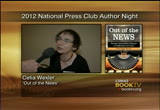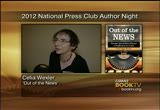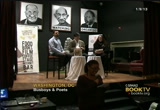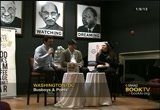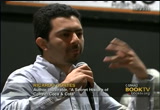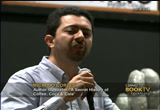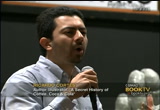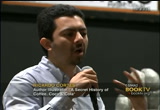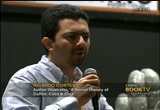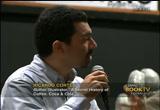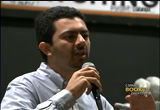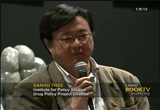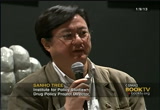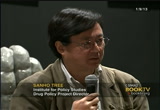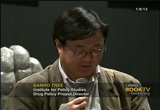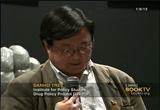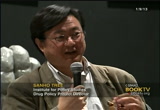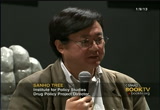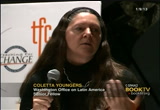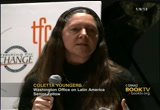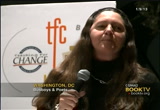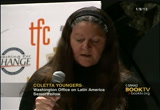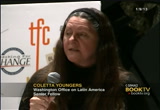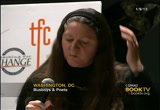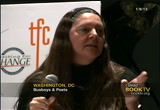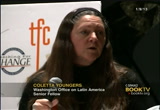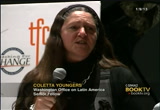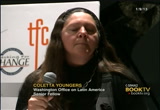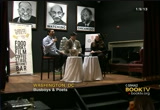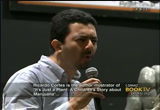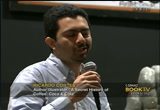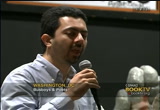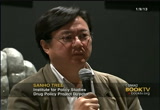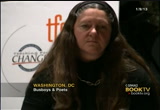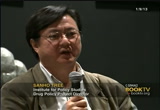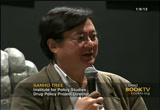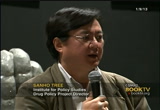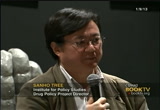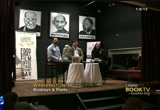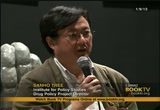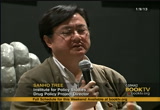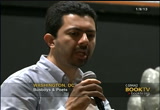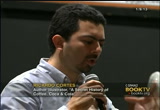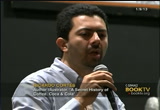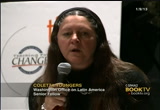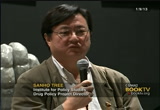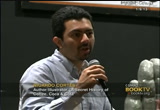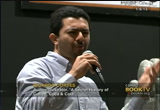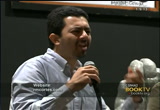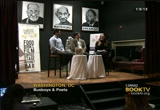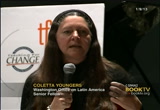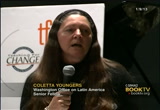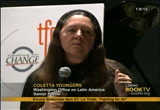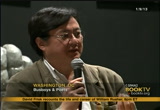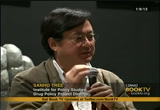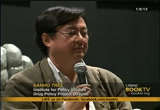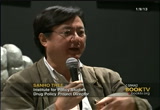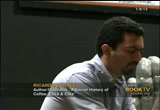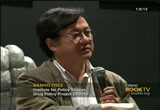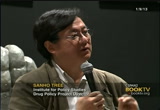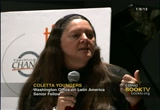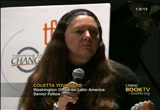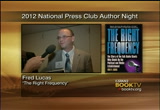tv Book TV CSPAN January 19, 2013 4:45pm-6:00pm EST
4:45 pm
criticism -- criticism. the lives of journalists are very exciting and rich. and sometimes you leave and start their own nonprofit investigative journalism as chuck lewis did. some time they leave like david steinman and become the author of the wire. these are people who had rich and varied stories. and they end up leaving the reader with an idea that journalism is not dead, that the future of journalism is a little uncertain, but the need for journalism continues. >> you profile even journalists, former journalists in this book. what is different now in today's contemporary landscape in journalism and media? >> i think the biggest
4:46 pm
difference is we are 24/7 so that right now journalists don't have much time at all to go deep. there never was a lot of time to explore and be thoughtful but now it is all about breaking news. that is of big difference. there is also not a lot of opportunity for journalists to learn and grow and become more proficient and more knowledgeable. i think that is the difference now too. >> was there something you heard from all even journalists that resonated why they left the profession? >> i think most of the mcnall of them said basically i wanted to do more and do less. >> would you ever come back to journalism? if so what would you cover? >> i am not sure. i love writing, i love writing books. it is more likely i would do another book. >> if your are a former
4:47 pm
journalist interested in the profession, celia wexler is author of pointe du hoc -- "out of the news". >> now ricardo cortes talks about attempts to prohibit the use of coffee and coca in the u.s. and around world. ricardo cortes describes secret deals made by top u.s. anti-drug official harry and slinger to keep the coca-cola co. supplied with cocoa while trying to ban its use worldwide. this is a little over an hour. >> tonight we are pleased to welcome ricardo cortes to discuss his latest book "a secret history of coffee, coca and cola", a tale of coffee, coca-cola, secret formulas, special flavors, special favors and the future of prohibition. ricardo cortes is creator and
4:48 pm
illustrator of subversive books for all ages but mostly all ages about such things as marijuana and the jamaican bobsled team. his latest book examines a series of highly addictive substances that have caused many deaths and fueled much profit, how they make their way into the u.s. and what the u.s. government's role has been in insuring they come into this country and this evening we are pleased to be joined by two drug policy experts as well. san ho tree and, though -- ca e carletta anhgo. i want to hand it over to the panel. [applause] >> thank you so much for coming out here. i just came in from new york. great to be here. i am going to start by talking about my book and then go into -- which focuses on coca and
4:49 pm
coca policy and how that is relevant especially this week with what is going on at the un and the history of the tree that prohibits coca around world. my book started as a children's book. it started as a follow-up to a children's book about marijuana in 2004-2005. it wasn't a book about teaching kids how to smoke weed. it was uneducated -- it occasional book about how to talk to your kids about the cult subject that they might run into. that is why the format is like an illustrated picture book for kids that as i got deeper into the subject and started looking into coca which ford jenna lee as i thought was relevant to children's lives, not so far removed, there are families involved in the aggressive policy is to eradicate coca but that is a family issue and a social and cultural issue but as i got deeper into the history of
4:50 pm
coca specifically the relationship to the coca-cola company, the origins of cocaine from a medical marvel to the drug problem we have today, it got really complicated and now e-book for adults. i also started back before coca, "a secret history of coffee, coca and cola," i started with coffee because i wanted to do a comparison of something that always fascinated me, changed the perceptions of these change over time. the cultural perception, legal, social perceptions, i was inspired by michael collins's book about the history of four different plants, when being apples. they were not the fleshy fruits we all know today, they were used in fermentation purposes.
4:51 pm
people would get drunk and there were people who wanted to ban the apple. i looked further and found there were other plants similarly that today you say that is incredible that people have problems with tomato or potatoes that were not in the bible, which have problems with it. and now coffee. coffee is fascinating because there were points, the mists of coffee and eventually going throughout these, there were questions to the health of it, the religious legality of it and times when coffee was banned, coffeehouses were shut down sometimes for health reasons but sometimes political reasons. there was political discourse but i saw that this coffee was another plant with an alkaloid as its principal activating
4:52 pm
ingredient, caffeine. that was something that went through these cycles of experimentation and prohibition and acceptance. coffee is pretty much legal in most parts of the united states today. so at the 18-coca is very similar, but on the same mountainside by the same people and they both have our polloi as the principal ingredients. the caffeine and the cocaine are both in their pure form powerful stimulants. caffeine is toxic in its purest form and so i wanted to make a comparison about those, and get into the history of cocaine. that is when it crept into the
4:53 pm
question of coca-cola. the coca-cola company. that fascinated me because i grew up with those rumors. there was cocaine in coca-cola. started to take the cocaine out of coca-cola in 1902-1903. they met a german cocainemaker who basically was the person who would take out the cocaine in new jersey and we could talk today, that pharmaceutical company, that chemical company is still there today, you can go on the web site and every year see how they have to register coca leaf and register the production of cocaine as a
4:54 pm
control substance. so i went into that history and found out coca-cola -- absence to coca leaf in the last century and where this comes together today and that we will get into this the coca became prohibitive around the world through one of three treaties that dictate international drug policy and the first was the 1961 single convention on narcotic drugs. that was the treaty that today still says bolivia is supposed to eradicate all their wild coca bushes and stop the shooting of coca, something that has been going on in south america for thousands of years and the coca-cola company have a role in that negotiation of that treaty. i went for the national archives and when you see a lot of this book there are illustrations of the pictures that i took in the
4:55 pm
archives of the documents. instead of a prose book and writing the word south i found boxes of documents, the federal bureau of psychotics and harry enslinger, i took photographs of them and then i illustrated them. what you will see in the book, rather than the tell the story in words i recreated these documents, these letters, this correspondence. literally decades and decades between harry enslinger who you may know as the architect of the campaign against marijuana, that was one of his strong -- she was really active and successful in prohibiting marijuana. at the same time he was also the point man for the federal government in its negotiations at the u n to of pointe du hoc--the rangers
4:56 pm
who accomplished d-day's toughest mission and led the way across europe" 18. when that was happening harry enslinger was in communication with the coca-cola company primarily to vice president ralph hayes who i really got to feel a relationship between them over time. they had an interesting parlay between each other. that is the beginning of the overview of the book. i want to pass the mike back and forth and i think we will have questions for each other. that is the beginning. >> i am with the institute of policy studies where i run the policy project. i was once asked to talk to a group of high school students and they look at your resume and background and came up with the topic and you had to speak to the topic and this being a high school audience they wanted to
4:57 pm
hear about sex, drugs and international relations. and i thought how my going to tie these things together. it didn't dawn on me until the last minute, and i realize the way to tell that story was the story of columbus to i consider the granddaddy of the international drug-traffickers. i use the word drugs, the we see the world depends on where you sit, where you stand, your perspective. i want to free for -- 3 frame the discussion in ways we may not think of. you know the story of columbus, after the spice route to asia,. he was interested in gold and religion. why spices. why were spices so valuable back then? it wasn't just that food was terrible in europe, it was. all the spices, each new exotic
4:58 pm
spice was thought to have certain properties, they might make you feel a bit more randy. how shall i put this? each of these new spices were the niagara of the day so that is one of the reasons his trade became so valuable. so after the conquest and colonization the settlers made fortunes exporting drugs back to europe and consuming them in this hemisphere as well and buy drugs i mean sugar which many people consider a drug, where we get rum from, definitely a drug, coffee, tobacco, and these aphrodisiac spices. these things became the developmental engine for hemispheric development. vast fortunes were created. think about where we are today, washington d.c. virginia,
4:59 pm
maryland. these were all drugs. the first time a lot of these drugs are introduced back to europe people looked at them with revulsion. tobacco. a bizarre thing. why would you put fire and smoke in your mouth? coffee was thought to be subversive. it had the death penalty in many states for good reason because back then people would consume alcohol. they would go to taverns and stuff. the only safe thing to drink was alcohol. with coffee you had to boil the water which made it safe but it stimulated people. coffeehouses became revolutionary. people started conspiring and talking about politics for the first time instead of just getting drunk every night. and initially it was a death penalty offense in many states and we had turkish coffee, english tea time, tobacco fortunes that drove a lot of u.s. and european development. and so a long story short, the recent half the world got
5:00 pm
colonized in some way is because of a bunch of old white men in europe. there you have sex, drugs and international relations in a nutshell but i tell this story because what we consider drugs is important and so when the mostly white males of european ancestry grafted this 1961 international convention got to exempt all of their favorite drugs the one they were partial to. .. very, very, very mild stimulant. plumb personal experience i
5:01 pm
compare it to two cups of coffee, basically. and so the thing that is hard to get across to people in the united states or policymakers is that copay is not cocaine. indigenous peoples should not be punished because some people, you know, refined into cocaine and abuse it. this is an ancient tradition that doesn't harm people. the arrogance by which the united states foreign policy trusted dictate terms to countries like bolivia, less than 1% of any excess cocaine in bolivia ends up in the united states. the heavy-handed nature of u.s. policy, you would think this is can't -- some kind of flood. now imagine if the united nations and the guardians of the un convention were to treat coffee with the content they
5:02 pm
treat cocoa. what would happen if they told bolivia's and peruvians you have to stop chewing coca which they have been doing for centuries, if not thousands of years? imagine if they did that to the united states. you have to give up this habit. what would happen? well, a friend of mine actually did this. andrew epstein went to amherst college. in 2001 he conspired with the school demonstration in student government to secretly been coffee for one day without notice during finals week. so all the students get up the morning. there's no coffee in the cafeteria, bookstore, no coffee being sold on campus. they have fans dress up and trenchcoats as drug dealers. you want to buy a shot of espresso. six bucks. study covered coffee beans, and people were buying the stuff. it made the new york times all this stuff.
5:03 pm
so that is the kind of outrage you would naturally expect if someone told you could no longer consume your favorite stimulant. that is, think that you begin to understand some of the indignity and outrage from people in the andes when he ignored people decide, the people decide they can't to cope anymore. and then finally, i would just say that this treaty to 1961 treaty, 52 years old now. and the u.s. and a number -- a small number of other government said that we should not reinvent these treaties, as if they were carved in stone. so much has changed. would any of these governments defend the fuse on gender equality? on sexual orientation? indigenous rights, race relations based on 52-year-old attitudes? of course not. we have evolved. our views have changed. we have become better. the same people who want to
5:04 pm
protect their turf are saying, no, we must never revisit these conventions. these things should be set in stone for all time. of course, that time has come to change these things. one to talk more about these inventions. all turn this over. >> thank you. so i would like to just offer a few more reflections on the coca leaf and then talk primarily about what is going on with regards to efforts to reform the international drug control convention and then i will conclude with some thoughts on the growing movement for drug policy reform. what i really like about ricardo's but apart from the illustrations, which are great, is how he reveals the hypocrisies of the so-called war on drugs, u.s. war on drugs. one of those, as was pointed out, is how poppy is treated differently than coca command would even go further in saying that my own experience is that copay is a mild stimulant, but it does not have the edge the
5:05 pm
confidence, so you can drink two cups and go to sleep without any trouble later that night. i drink two cups of coffee in the afternoon, about half the night. i can't sleep. it does not give you that two hours of the drinking or half-hour after you drink a cup of coffee you kind of crash. a mild, very nice stimulus and it as a variety of additional values. apart from the fact that it has been used by indigenous people for religious and cultural, and the persian reasons and medicinal reasons for centuries now, there is an effort to create a variety of legal products taking advantage of what it offers, not only in bolivia, but also in peru and colombia. so not long ago i was in bolivia and have the upper to the visit of processing plants that the government has built in the coca growing region of bolivia and had the opportunity to sample some of their products. they have a marvelous cocoa
5:06 pm
accord which are really like. a variety of energy drinks. an energy drinking columbia, a group produces which has a great flavor to it. again, it is not like drinking red bull. it is a very nice kind of stimulant. it would be much better for you. all kinds appointments, a variety of red. also these -- what they call titos which are basically cheese puffs that the government is distributing the kids. a free. i thought there were awful, but i guess the kids like them. i can send that i really hate coca toothpaste. but my point is that there are a variety of products that have very good uses and should be
5:07 pm
available not only in these countries, but also in the international market. a variety of uses beyond what coca-cola uses for flavoring. another hypocrisy of the @booktv of the hypocrisy that is pointed to in the book is related to the conventions. i was really struck reading your book. i had not realized it. this cozy relationship which in the u.s. drugs are for decades and the president of coca-cola. very cozy relationship. in the end the 1961 un single convention on narcotics, drugs and a subsequent 1988 convention made coker growing a criminal offense under current -- international law. while coca-cola was guaranteed the right to use it as a flavoring in their own product, indigenous peoples across the andes are told that the traditional practice of coca leaf chilling and drinking tea would no longer be tolerated by the international community, and it is important to point out
5:08 pm
that the u.s. was the architect of these treaties commensurately have support from other countries. today they have key allies in their effort to maintain the treaties such as russia, japan, sweden. really is a u.s. estimate. so coke go along with cannabis and opium became the main targets of the 1961 convention. this historical error, as i like to college, was basically justified by the 1950 report of the commission of inquiry on the coca leaf which is a totally racist document. it is totally, totally racist. has absolutely no scientific evidence. you can find it on the web now. you will be out raised as you read, it is still the basis for the international drug control conventions treatment of coca. subsequent to that in the 1990's the u.n. world health organization carried out a study
5:09 pm
of coca and cocaine and concluded that the use of coca beads appears to have no negative health effects and as positive therapeutic sacred and social functions for indigenous indian populations. there are a variety of studies including one done by harvard that points to the nutritional value. but in response to the who study, not surprisingly the u.s. government, it died in peer review and was never published, although you can find it on the internet. the 61 convention also calls for the elimination of coca chewing within 25 years going into force of the convention go and that ran out in 1989. in the meantime got the international community adopted the universal declaration on the rights of indigenous peoples which calls for the respect with the cultural traditions and medicinal practices of indigenous populations. for many countries including the
5:10 pm
united states they have basically accepted the idea of the indigenous use of coca leaves. for years you could get coca tea in the u.s. embassy in order to help deal with altitude sickness the only ticket away after san another started pointing out that it was readily available at the embassy. yet despite these changes the u.s. government and other governments to allow any changes to the international conventions , and any changes that would correct this historical wrong. turning knelt to efforts to change it a real turning point in the relations of the international community. and in terms of the government policy toward the coca leaf. they basically in the administration adopted the
5:11 pm
approach of eliminating the forced eradication strategies that have led to so many human rights violations, violin social conflict and replace that with a program of voluntary social control which is actually having better results than the previous policies and certainly better results than neighboring peru. in 2011 there was a 13% decrease in net co-production in that country according to the u.s. government. but with regard to the international convention, the government began a campaign to try and write -- correct this historical error. the first thing they did, which everyone agrees was sort of a modest effort at change was to try and amend this 61 convention by removing the to sub paragraphs that basically say that coca leaf chewing needs to be abolished within that 25 years that has now passed some years ago. they simply wanted to delete those two paragraphs.
5:12 pm
without any objections bolivias request would have been automatically accepted. but not surprisingly the u.s. led the charge to oppose that amendment to the convention, rallying what they called a friend of the convention group of governments, 18 in all, which objected and hence thwarted bolivia's effort. in response to that one year ago the bolivian government decided to withdraw from the 1961 convention and reid here with the reservation regarding the traditional and legal uses of the coca leaf. and the way that process works is that one-third of member countries would need to formally object to prevent bolivias' real adherence to the convention one year later. in fact not tomorrow is the deadline for countries to oppose bolivia coming back into the international convention. as of midafternoon today i know of 13 countries that have
5:13 pm
objected. of course the u.s. is the first. on sure there will be a few more in the next 24 hours. but at this point it is obviously not likely, highly improbable that you would get the 62 that you would need to prevent bolivias return. on the one hand this is a victory for bolivia. they will be able to return with their reservation. it will only affect bolivia, not the convention. so internationally this historical wrong has yet to be corrected. the u.s. government, as i said, was the first to object. they basically said they were objecting because allowing this change would lead to a greater supply of available coca and hence would lead to more cocaine and more drug trafficking. that argument is absurd and so many levels that are not even going to go into it. their fear is that this is going to be the beginning of more
5:14 pm
serious changes to the conventions and that other countries are going to follow suit. in other words, any change to this outdated documents, these outdated documents will open up a pandora's box of attempted reforms. i think, frankly, that they have reason to be concerned and will conclude with this. they are afraid that marijuana is going to be next. why not? legal regulated markets for cannabis are being proposed. that is likely to pass in the next six months. it will be the first country in the world to have legal cannabis markets if it does. we just legalized marijuana in colorado and washington. we were at a forum yesterday there was co-sponsored with brookings. one of the panelists said the u.s. should just withdraw from the convention and read it here like bolivia did. obviously not likely to happen, but the u.s. is now at odds with the very international conventions that it created.
5:15 pm
there is more and more impetus for reform coming, particularly from latin america which has borne the cost of the u.s. war on drugs, increasingly officials are saying why we implementing these policies that have made things much worse in order for u.s. consumers to have less drugs available to them? that just doesn't make sense. so for the first time you have sitting presidents as opposed to ex-president's who are calling for a serious debate on drug policy reform. there have been a series of initiatives that we can go into detail on in the discussion that are coming from the region. but most significantly at the request of mexico, colombia, and guatemalans, the u.n. because stock has just approved the holding of the un special session, you and general assembly's special session on
5:16 pm
drugs which will take place a few years from now, 2016 and will provide the next release serious opportunity for convention reform. he knows what will happen. it's too far out, but there is clearly a move for change in the region, and that is why the u.s. government is so nervous. >> i actually want to tell one more story. as you were talking, it reminded me. so as you were saying, the coca-cola company was aligned with harry and lynyrd to codify this special access to police. the coca-cola company got that access to the 1961 single convention. after that happened the coca-cola company's have legal access to coca. but it was always a little politically problematic for them to be in -- to ensure that there would always have access. changing governments in latin
5:17 pm
america. and never know if there will have been in. they wanted to try to grow coca in the united states. that way they could have better access to it and also -- i think they want to have greater agricultural knowledge of the plant. basically to be able to tinker with levels of cocaine, to tinker with the different flavors. so they asked a federal government can actually at this point right after the convention and severe retired as commissioner and moved on to represent the u.s. of the u.n. we had a new commissioner, g. o'donnell. the coca-cola company asked him, okay, we wanted to grow coca in the united states. can we work something of? and so as allies they said to short. what do you what? the u.s. virgin islands. how about hawaii. so they went to the university of hawaii and contacted the president. we want to start this pilot program to grow coca leaf on
5:18 pm
u.s. soil. we have worked out all the legalities even though it is technically not legal, this is a matter of scientific research. the president of the university of hawaii said, well, that's great, we can keep it secret. we can't take the name of the project. we are a public university. so unless it was a matter of national security something. and so the federal bureau of narcotics was like, yeah, it's a matter of national security. okay. sure. it's a secret now. so this project went on. starting in 1964. went on until 1984. the funny part about this and web bring this up, but copay did not grow very well. in fact, most of it died. and some 1984 the abandon the project. the u.s. to provide of agriculture took over the project because the water to
5:19 pm
find out why it was dying. they eventually figured out that there was a fund is taking it over killing it. and so the dea took over this project because they wanted to develop this fund is as a way to eradicate coca. i find that one little story is just really a marvel because i think it encapsulates the whole relationship that is going on here. we have this plans that indigenous people are denied access to. a lot of cultural value to people. there are denied access. but yeah of multinational corporations that are granted special privileged access so that they can use the same leaf to make billions and billions of dollars, and that is what they did. they start this experiments of the the can make more, and it does not go so well. the u.s. government takes it over and transforms that same project into a way to eradicate coca back in the amazon.
5:20 pm
and so the last i heard to my think it was president clinton who said -- the da was asking to released this fungus into the rain forest. president clinton said no. the last heard in 2007 was that they're looking into ways of using this fungus as an eradication methods. sounds kind of fd to me, releasing a fungus into a rain forest. but, yes. i think that is an interesting way of seeing how these privileges are afforded to some powerful factors and not to others. >> i would just that quickly, first on the fungus think, one of the great experts in this town was sitting in the audience and is done a lot of research on this issue. perhaps we can talk later. on the question of the u.s. embassy, the u.s. embassy's own website used to recommend to travelers landing in la paz to have copay tea.
5:21 pm
it is and no-printer. how many people have been? its about 13,000 feet high. the airport which is a plateau above the city is even higher. so your oxygen content at that altitude is 40 percent of what you would have the sea level. he suffered terrible outages sickness. headaches. you just want to do anything for the first two days unless you consumed cocoa product. whether is chewing coca or having the candy disability airport or tea. and that will allow you to a acclimate to the altitude. and so it is not what you feel. it's what you don't feel. you don't feel high, but you don't feel the altitude and you don't get those headaches. so it is a very benign products. but one more point about the perceptions of coca. when the spaniards first started heading south, they started getting to the andes.
5:22 pm
they ran across indigenous people who led the custom of chewing coca. a church but, this must be the work of the devil. man they bandit. until they ran into the biggest silver deposit in the history of the world, a mountain in bolivia about 14,000 feet high. there was no way they were going to deal to force indigenous people to mind at that altitude without coke of. and so suddenly the church did 0180. instead of being this band thing it became mandatory. such perceptions change. >> just add one more comment in response. we are poisoning the rain forest because we are engaged in aerial spraying, as most of you know in colombia which has a whole range
5:23 pm
of negative effects on that country and on the amazon. and just to end with an anecdote , the u.s., a former u.s. ambassador to peru, ambassador in the late 80's told me a story. there were trying to convince the peruvians to allow fumigation programs for aerial spraying in the country. they were trying to convince perot. it brought up a delegation to georgia to show them how they would do the spring. they started the little presentation and then out what these men in white astronaut suits covered from head to toe with the sample of the spraying and the peruvians just rant and said, we're not going to do that. >> and son now we will -- by a show of hands will bring the microphone around so that everyone can hear the question and then we will start our discussion. anyone want to kick a suffer the
5:24 pm
question? comment? something you want to share? it doesn't matter. all starts here and come up here. >> i was just wondering as a follow-up, did they ever have a widespread eradication? >> widespread, but not effective. so in colombia where they do the aerial spraying, fumigation, we destroyed millions of acres of coca and rain forest environment. one of the most by a diverse countries and the world, literally scorching the years. but what are politicians don't talk about is that colombia is bigger than texas and california combined. the same is true bolivia and peru. a very large land masses. trying to eradicate is like trying to wage a war on dandelions in the united states. good luck. it's not possible. nonetheless, after 12 years of
5:25 pm
spraying and just merciless onslaught of eradication, 12 years ago 90 percent of cocaine in the united states originated from columbia. after a dozen years of intense drug war in colombia, today about 95 percent of u.s. cocaine originates from columbia. whereas less than 1 percent originally from bolivia. oblivion's actually have done much better in terms of eradication, interdiction of cocaine transiting through peru to brazil and argentina and other countries. also, they have captured and seized more of that than previous governments that were very subservient to u.s. interest. so by any objective standard the bolivia's have done, you know, better than previous governments and get our state department still denigrates their efforts, at least in public. the eradication in bolivia, there has been manuel forced to medication and peru as well
5:26 pm
which is very, very violent and difficult to stop -- stomach. i used to think that manual eradication might be a kinder, gentler way to do it. then i ran into an eradication team and watch them do this. a national police literally hold the family members at gunpoint at their little shack while a team of 40 men to men and within a half-hour destroyer livelihood and approve all your trees and bushes. what happens is that you force these people into food and security. these are peasant farmers. in bolivia for the longest time was the poorest country in south america, tremendous poverty. when you destroy their only source of food security that penick. hell am i going to feed my family next week a month, here? what is the one crop to know how to grow that is relatively easy to transport, and like pineapples and other perishable crops were you need roads and
5:27 pm
refrigeration, for which there are ready and willing buyers. that, of course, was coca was guarantees they will panic and replant. so the cost and cycle was finally broken by the administration that granted the right to grow a personal amount of coca. each family allowed to grow what is called a common those. that is enough to guarantee a modest income for family. you will get rich, but you can save a little bit of money, send your kids to school. very basic things, but you can save a little bit of money. then you can start to diversify the economy. i've seen these villages that under u.s. policy with constant conflict, and security to a more of the same, rents, leather, repeat, like shoveling water and is completely ineffective. now i go back to some of the same towns and their flourishing the economies of diversifying because these farmers now have some food security, some
5:28 pm
predictability and they're able to invest a little bit of money if they have an experience cooking, it will open a little restaurant or hotel or car repair shop or whenever, and that is a you get the economies of coca. it is like the recession here in the united states. as long as people are insecure in don't know what tomorrow will bring it will hunker down, they will not take risks, invest, and diversify. >> i would just like to congratulate our three speakers. what he considers myself to follow this issue closely. at some interesting insights tonight. i learned a congratulate you for your provocative and effective presentation. i want to make two points in addition to that, and that is to bolivia, you mentioned the embassy. i suppose advising americans that they should assume coca.
5:29 pm
there are other non and business sectors very definable like student groups are truck drivers are taxi drivers who are big consumers of cocoa for functional reasons. more than a couple of cups of coffee to stay up all night to study for exams. truckdrivers to stay awake on the roads to diminish traffic fatalities. so you have a lot of very nice middle-class sectors. it struck me that pursuing these can be very productive for your interest in working on changing attitudes and perceptions working toward policy changes. marijuana, there is so much movement on that right now, americans are thinking about it. the more you can draw parallels it seems to me to be very productive and very enlightening to people and help them think about it in different ways. i wanted to ask first, in a 1961 convention they did call for
5:30 pm
also the 25 year elimination and consumption of marijuana. how is it that you define those goals? >> thanks. i would just like to point out that the bolivian government is delighted that the u.s. is now out of line with the conventions as they are. with regard to this 61 convention it was just go up. it does not call for the -- it, of course, makes illegal the growing and consumption @booktv actually, the '88 convention. a growing and consumption. growing and production, not consumption of marijuana, cocaine, and puppy. puppy -- there are a variety of exceptions. and just to be clear on this concern the, the conventions make production and trafficking in illegal.
5:31 pm
there is nothing in the conventions that makes consumption illegal. for example, the dutch coffee shops where you were able to consume marijuana, that technically does not fall outside of the conventions. what falls outside the conventions is the people who sell the marijuana to the dutch coffee shop. as i said, it was the special commission on the inquiry of the coca leaf that led to such dramatic actions with regards to coca. >> i think marijuana is a very good illustration of how things changed generational. i do believe marijuana is a gateway drug. give way to becoming president. every president we have had since 1993 has abused our drug laws in very serious ways. some of them possibly even in to the mandatory minimum territory. that also speaks to the entire generation of lawmakers.
5:32 pm
newt gingrich, molinari, rick santorum, a lot of these. al gore. they all concerned marijuana and had admitted doing this. in fact a much harder now to find people who came of age should not experiment. you recall that democratic primary where they had the democratic wannabes on the stage. at think it was anderson cooper harassed them raise your hand if he did not use marijuana. joe lieberman had to sheepishly raised his hand. the question then becomes, what is the basic legitimacy of the laws, the hypocrisy under which these are written and voted on? use of the same people who violated the laws now voting on more of these laws. the question has to be asked, what a prison sentence have been good for your life and career? if not, why is it good for all these other people? a particularly poor people and people of color. it's coming from a circle and we
5:33 pm
can avoid it much longer. >> thank you. enjoying the presentation. i have a question of where the pharmaceutical industry is in all of this and if they also like the coca-cola relationship with the drugs are. i am assuming there are a lot of pharmaceutical products that rely on the coca and codeine. where does that -- where they get their supply? are they also aligned with setting themselves up nicely will also more of the draconian policies? >> well, i can't speak on the pharmaceutical companies that large. you might be able to chime in on that. i do know that the process that the coca-cola company outsources to new jersey basically to get the flavor essence, the flavor extracts that they use for coca-cola, you take the coca leaf, import tons of coca leaf,
5:34 pm
imported hundreds of tons of coca leaf of the last century, and then there is a process to extract the alcoa to extract the cocaine. it comes out of that process, are really fine grade of cocaine, probably the best to find in the united states of america manufacture by this company at the behest basically of coca-cola. and the last verifiable "that i could get was that they were selling to the pharmaceutical industry to a pharmaceutical company. i'm not sure of that is still where it goes, but cocaine has been historical used as a local anesthetic or topical anesthetic. there are still some uses of the medical industry, although for the most part cocaine has been now replaced by synthetics like lidocaine and novocain. but there is still some medical use for it.
5:35 pm
>> where the coca comes from. it comes from peru. yes. and not sure if they ever got it from bolivia. i heard that they talked about that was happening. i had never seen evidence, but i heard that it did come from bolivia's will. peru is primarily where it comes from. now, where it goes to after that, new jersey. i am also curious and have not been able to discern the set. are there other countries where coca-cola has been able to do this? in my research i was in the national archives, following this thread where they were trying to do the same thing. just a couple of years ago trace elements of cocaine were discovered in red bull, : germany which leads one to believe that, yes, this has been going on in other countries, not only the coca-cola company in
5:36 pm
the u.s. that has access to these extracts. when red bull got it at one point it did not do such a good job of taking nicotine out some us that there was still some that they found. >> i would add that in fact the international drug control conventions were set out to allow access and monitor access to controlled medicines. so i don't know a lot about this. there are people who follow it closely, but, yes, international narcotics control board is specifically test with overseeing the export and importation of what are otherwise illicit drugs in order to ensure that people have access to painkillers basically, and it is primarily puppy related, opium related, but also there is a small market of controlled cocaine production very heavily monitored by the incb for that purpose.
5:37 pm
>> we have a question here. >> yes. i would like to a circle around back. what do we do politically? and i have a small opportunity here for people if they are interested. there is a special election coming up. there is one get it running on the green party platform which says, stop the war on drugs and normalize recreational drugs. i do have some petitions that you can sign later. >> the question is what do we do . from a policy perspective, if you don't -- how many people have communicated with their elected officials to express their views on any subject? good. to allow the people in this country, however, don't. think there's nothing i can do to do this. when i was in high school and a good civics teacher.
5:38 pm
i was toddies of the three branches of government, their power as commander java's to show up and vote. if you are upset about something, write a letter. in fact a mother is a whole toolbox of things we can do at the local level to make tremendous amount of leverage if you know how to build effective coalitions, how to communicate with legislators effectively. history is made by those who show up. it pretty much guarantees things won't change. on the other hand if you start learning how to do these things to ask for meetings with representatives, then you become the squeaky wheel. elected officials, members of congress don't have the opportunity to take polls. is simply too cumbersome and expensive. and so they want to know what kind of letters they're getting. op-eds and columns. how many faxes to we get from constituents, phone calls, people that came to visit.
5:39 pm
so they extrapolate. there are very few people on the other side pushing for more drugs. this gives us an advantage in terms of representing ourselves. that means you have to involve. >> in the research of this book, i researched the coca-cola company several times. at first under the auspices of writing an article about the flavor profile of coca-cola. and then when the question of coca-cola comes up, cocaine, the rumors of cocaine, the shutdown. as tumpline, he actually told me. this is what i have. this is what i say every time someone asks about that. the secret formula is one on most voluble assets that we cannot talk about it. they get to hide behind this
5:40 pm
veil of secrecy by claiming that it is part of their plan. as their plan. in fact it is their plan. you can go down to the coca-cola museum down in georgia, the secret formula behind a bank vault. it's part of the allure of coca-cola. it's a secret. but they have a twitter account. talk pendleton, the pharmacist you invented coca-cola. so now they have a twitter page for him. he speaks an all-time language and talks about riding horses. i sent him a drawing that i had done when i was a child. when i was a years old.
5:41 pm
coca-cola. prohibited before cocaine was. they had to take the alcohol out. that's when they added the caffeine to give you an extra kick. that was the cola. so i said that picture. he's like, oh, that's great. i love it. don't show the polar bears. they might go after you. you want to tangle again. basically i was trying to reel him in because i said, i have another question. about this convention, a narcotic drugs. how do you feel about how that coca-cola has access and indigenous people are allowed to have a? at that point he did not answer. it's funny because the little twitter page, his avatar was like a secret. so i did that so that i could illustrate the entire dialogue
5:42 pm
as a way of just, you know, interfacing with these companies. i had actually planned to continue to keep knocking on the door and asking about this. it. >> we have a question here. a great. question here. another woman over there as well. >> thank you so much. this has been fascinating. i was wondering if you guys to tell us, if you could set your ideal policy for the war on cocaine specifically in the illegality of cocaine in the u.s. right now, with that policy be and how does that fit in with politics that you talked about? >> at think you would get a lot of different responses to that within the drug policy reform movement, and i want to underscore that there is a drug policy reform movement here in this country and also in latin america, particularly in latin america that was not the case a few years ago.
5:43 pm
it is a no-brainer. absolutely no reason it should be prohibited in international law. no reason that countries like bolivia, peru, and columbia should not be allowed to market coca products internationally. there is no reason that coca-cola should not be allowed to use their flavoring. of course, other countries should be allowed to do the same the amount of cocaine alkaloids in the coca leaf is minuscule, tiny. it is very small. it does not pose any kind of danger when used in its natural form. i do think that there is an issue with the people who grow coca, some of the poorest people and let america. these are poor farmers with small plots of land. i think we have an obligation to help those countries bring those people out of poverty. that means comprehensive equitable, liberal developed economic development programs in
5:44 pm
areas like the bolivian shikari. with regard to cocaine at think that is where it is trickier. there are people who would advocate for complete legalization of drugs. one drug use should not be illegal and we should not be putting cocaine users are users of any other drug in jail. i think we need to a experiment with marijuana legalization said that we begin to have some body of scientific evidence to see what happens when you legalize first a drug that is much less dangerous and what we can learn from that as far as looking at more dangerous drugs such as cocaine and more addictive drugs such as cocaine. and i also think we need to fundamentally revamp our drug laws. this is an issue of work a lot on and let america.
5:45 pm
we have created a system where we put in jail primarily small-scale drug dealers, they guy is and the girls and boys selling the drugs and the street corner, running drugs back-and-forth. the people in the indian countries who are transporting drugs. these people and not making money off of it. the did you arrest them they are replaced by the drug trafficking organizations, yet they go to jail and in this country and particularly in latin america which is adopted across the board in many countries, harsh u.s. drug laws, they can end up with 20 years in jail. one example, ecuador which really has a minor player in international drug trafficking networks, the maximum sentence for murder in that country is 16 years. the sentence for drug trafficking is a minimum of 12, maximum of 25 years, and it does not distinguish between your level of involvement in the drug trade. you go to jail and ecuador and
5:46 pm
you find people who are selling drugs in the street corner who had a judge that was in a particularly bad mood that day was worried about getting his u.s. be surrendered and gave him a sentence of 20 years. he ends up in jail for longer than somebody who has committed murder. is just ridiculous. we need to do a major reform of our drug laws to ensure that sentences are proportionate to the crime committed. >> i would just add that the way we talk about this is difficult in the united states. americans are very simple minded people like simple answers unfortunately. black or white, yes or no. you are the good guys. which team driver for. in fact another is a spectrum of regulatory possibility where we -- the poverty of our political discourse prevents us from having a meaningful discussion about this issue so that the inuits, the eskimos have some two dozen words to describe
5:47 pm
snow. increasingly it is disappearing, but that is the richness of their vocabulary. yet we whole democracy to be so valuable in this country, so much so we will exported and invade other countries and impose it, but we only have two words describe democracy, democrat republican. if you dare vote green party or social democrat or socialist libertarian or whenever you are viewed as some kind of french freak. and jim robs us of choices. so we are not allowed to consider the spectrum of regulatory possibilities, even in human politics. in the history of the human experience we had everything from totalitarian fascism to anarchism on the other end and everything in between, every human society is found for ways to organize its culture, economy, politics. we are not allowed to consider any of those in the consumer -- experiences.
5:48 pm
in fact legalization is a word i think that has become radioactive. they hold a very simple the economy. at the support zero tolerance or you are accused as i was of wanting to sell heroin in candy machines to children. there is a whole spectrum of regulatory possibilities for different drugs to meet structure be treated differently right now we have a one-size-fits-all. can so we're going to have to experiment and find out which policies work best for each particular drug. stimulants are a bit more problematic, but we need to find up to what extent our war on cocaine originally in the 80's helped popularize and spread a poor person's version of cocaine, crack.
5:49 pm
to what extent that our war on crack helper popularize the poor person's crack, mess. each time we end up with an easier to produce, more difficult to stop the more problematic, more dangerous drug and this is a lesson we should learn from alcohol prohibition. there are many lessons we have not learned from out of prohibition. put it this way. if you were a bootlegger during alcohol prohibition the last thing you wanted to smuggle was beer. a giant cake of beer has a very low return on investment and you run the risk of going to present. the most pure firm of alcohol imaginable, whether it's grain alcohol or moonshine or hard liquor. but given choices out many of your drinking liquor tonight? pier one. but the drug war, the super powerful drugs, people will always gravitate toward that. any of you can go out if you're
5:50 pm
over 21 and buy grain alcohol. how many of you have tasted grain alcohol since college? people don't want that stuff. see it actually prefer to. the idea is a false one. >> just to underscore one point, flexibility. one of the big complaints about the international convention is that the u.s. with the conventions and in the policy toward latin america has basically pushed a one-size-fits-all policy designed in washington. what countries are saying is, our reality may not be your reality. our reply is that tiny little country of 3 million people that has a really primarily urban population with solid institutions which has a very good capability to my great legal regulated markets for cannabis. why can't they do it? why should the international drug control convention say that they cannot do that?
5:51 pm
will we really need is a regime that allows for flexibility, that allows countries to experiment with what they think works best for them. >> will we to do with the billions of dollars we invest in the prison infrastructure. that gets transferred into education and then people make wise decisions. like you said, there is access to these dirty, cheap, bad drugs. people were able to get access to much more benign drugs like marijuana they might make decisions that if they had the education to know, this is actually help your choice. we might not ever get rid of drugs completely, but there are six alternatives to the worse options. >> one last question over here in the quarter for the evening and then we will have to wrap up this portion and move on to the book signing. so last question for the evening.
5:52 pm
i want to thank you. a very good presentation. i think he presented a very good case. the coca leaf is innocuous or even beneficial. however, it is true, you get cocaine from coca. cocaine is quite a, well, it is a substance for you can make a lot of money. you have the drug cartels involved in that. how can you control the growth of coca without getting the drug cartels involved and keeping it from being processed into the cocaine that can be obviously a lot worse in terms of a facts on a society compared to the coca leaf? >> this is one of the most important concepts to get across about the war on drugs. why are these substances value? cocaine heroin marijuana, very
5:53 pm
easy to produce, cheap to produce. in an illegal market the cost pennies per dozen there astronomic the more expensive. the law that has to do with policies a prohibition. as long as there is high demand is a reservoir of farmers driven by poverty your greed or it to fund an insurgency or for whatever reason they get into the economy because they think they will get away with it and most times they do. but it is the risk. counterintuitive. the more we escalate the more value we build in so that you can buy a kilo of pure cocaine in colombia for maybe a thousand or $1,500. by the time he smuggled to the united states called by the time the dealers cut it in kg bags and diluted with whatever garbage to cut it with you can get a hundred thousand to 950,000 or even more for that exact same kilogram. if you send that same killer by fedex or dhl it would cost you 200 bucks.
5:54 pm
instead we keep escalating the the drug war. the greater the risk the longer the potential prison sentence the men after heard the higher the likelihood that get caught, the greater the threat to themselves the greater the risk premium they can charge to the next person. and so through the war we actually create a tremendous indirect price support if you will for drug traffickers. so the people -- the last people who want this drug war to end of the traffickers themselves because without it there basically transporting menem we processed her cultural commodities that don't touch a lot of money and the drug warriors. a semite dependency that they have. they both need each other to keep their jobs and livelihoods. so if you legalize, you take away the risks and suddenly it becomes like any other caricature commodity, like aspirin or men in the processed agricultural commodity. >> i would just like to add a
5:55 pm
slightly different perspective looking at it from the perspective of if your goal is to disrupt the cocaine market, what is the best way to do that? will we have seen, as was pointed out earlier, going after the coca leaf has very little impact on the cocaine market. very interesting studies that an economist has done in colombia. basically he concludes that this complicated that money invested in eradicating coca has almost no impact on the cocaine that is produced and ends up here. if you're going after the cocaine industry you're going to get a lot more bang for your buck going after the criminal organizations, going after the -- after cocaine shipments. in fact, we have seen in bolivia is that the government has put a greater priority on trying to a interdict the cocaine itself as
5:56 pm
opposed to forced eradication campaigns. although they do carry out voluntary cut eradication. at think you have to look at where we want to target our law enforcement effort and should it be the small farmers growing coca or should it be the criminal organizations and the people within those organizations who are making the vast profits from the illicit business. finally, i would just like to reiterate, ultimately it is demand that drives this process. the u.s. continues to be the world's largest consumer of illicit drugs. if we really want to be serious about impact in the drug trade we have to put a lot more money into treatment and education programs your home, distinguishing between gregory to recreational and problematic drug use which is another thing that relates to the question about better drug policies and ultimately will get this as a demand driven problem.
5:57 pm
>> and with that, i want to conclude our presentation this evening. as thank our panelists and all of you for coming out. [applause] >> you are watching c-span2 with politics and public affairs weekdays featuring live coverage of the u.s. senate. weeknights watched the public policy events and every weekend the latest nonfiction authors and books on book tv. you can see past programs and get our schedules of our website, and you can join in the conversation on social media sites. >> of white house correspondent and the author of a new book, the right frequency, the story of a talk radio giant who shook up the political and media establishment. you are the talk-radio giants we're talking about? >> well, of course you have today folks like rush limbaugh, glenn beck, with this goes all the way back to the very beginning, walter when shall,
5:58 pm
and it shows the trajectory of talk-radio beginning, really the beginning of radio. and i kind of you this is a history of the united states since a 1920 through the lens a talk-radio. >> , and all the way back, what you're we talk about? >> we are actually talking about the twenties. the dean of commentators. walter when shall, at one point he was a hard-core new deal support of hard core fdr supporter. he shifted during the 1950's and became a strong anti-communist big joe mccarthy supporter. he had a radio show, syndicated newspaper column to make a huge figure. fast forward. go through the 1960's, when the fairness doctrine was a major force in the sec was able to
5:59 pm
regulate the broadcasting industry, and there are two chapters on this. the johnson administration used the fairness doctrine to target some political enemies, one of the people i interviewed in year in addition to a number of us, mark fowler, the reagan chairman who helped dismantle the fairness doctrine. once you have that regulation of the way it allowed people like rush limbaugh to get a foothold in. that led to a real explosion of conservative, unleash. >> that was going to be my follow-up question. from 1920 to today, the predominant voices, was there a pattern? left right left? >> interesting enough, one of the things i write about in this book is out during the new deal you have a major metropolitan daily to the right.
132 Views
IN COLLECTIONS
CSPAN2 Television Archive
Television Archive  Television Archive News Search Service
Television Archive News Search Service 
Uploaded by TV Archive on

 Live Music Archive
Live Music Archive Librivox Free Audio
Librivox Free Audio Metropolitan Museum
Metropolitan Museum Cleveland Museum of Art
Cleveland Museum of Art Internet Arcade
Internet Arcade Console Living Room
Console Living Room Books to Borrow
Books to Borrow Open Library
Open Library TV News
TV News Understanding 9/11
Understanding 9/11